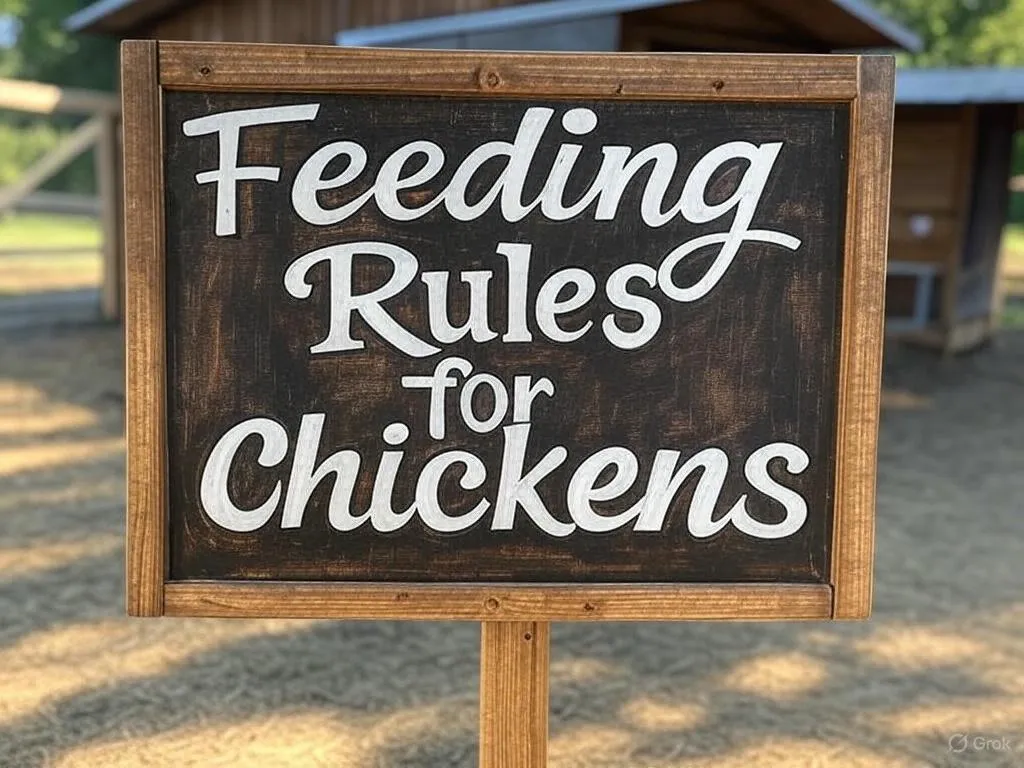
Banned Chicken Feed? The Truth About Kitchen Scraps & Coffee Grounds
Banned Chicken Feed? The Truth About Kitchen Scraps & Coffee Grounds
I remember the first time I heard someone say it was illegal to feed chickens kitchen scraps.
I was standing at a farmers’ market, talking with a fellow poultry keeper about different ways to cut feed costs. I mentioned that I like to supplement my chickens’ diet with vegetable peels and leftover grains. That’s when he raised an eyebrow and said, “You know, that’s actually illegal in some places.”
I laughed. Illegal? Feeding chickens scraps? That made no sense. Chickens have been eating kitchen scraps for as long as people have been keeping them. I thought he must have been mistaken.
But the more I looked into it, the more I realized he was right—at least, in some parts of the world.
And the reason why might surprise you.
Why Some Countries Have Banned Feeding Kitchen Scraps to Chickens
At first glance, banning food scraps for chickens seems ridiculous. After all, chickens are natural recyclers. They eat bugs, weeds, and leftover food. Why would feeding them kitchen waste be a problem?
It all comes down to biosecurity and disease control.
In places like the United Kingdom, Australia, and parts of Europe, strict laws prevent livestock keepers from feeding their animals scraps that have been in contact with human food. The main concern? The risk of spreading disease.
Historically, major outbreaks of livestock diseases—like Foot-and-Mouth Disease, African Swine Fever, and Avian Influenza—have been traced back to contaminated food waste being fed to animals.
The logic is simple: If food scraps have touched meat, dairy, or other potentially hazardous materials, they could carry harmful bacteria or viruses that spread through livestock populations.
In these countries, the law often states that any food waste from a household or commercial kitchen is illegal to feed to chickens, even if it seems perfectly safe. The concern isn’t so much with plant-based scraps like vegetable peels—it’s with the risk of contamination from cooked food, oils, meat, or dairy.
The law is strict because once a disease enters a livestock system, it spreads fast. In commercial farming, disease outbreaks cost millions, leading to mass culling and devastating financial losses.
And while backyard flocks aren’t the same as factory farms, the same biosecurity risks apply. If a small farm feeds its birds contaminated food and that disease spreads beyond their coop, it could have far-reaching consequences.
That’s why, in some places, it’s simply easier to ban kitchen scraps altogether rather than regulate what’s “safe” and what’s not.
What About the U.S.? Is It Illegal to Feed Chickens Scraps Here?
In the United States, the laws around feeding chickens scraps are more relaxed—but they do exist.
Under federal law, feeding kitchen scraps is mostly a concern for commercial livestock producers. The Swine Health Protection Act, for example, prohibits feeding pigs any food waste that has been in contact with meat unless it has been properly cooked to kill pathogens.
For backyard chicken keepers, there are no blanket bans on kitchen scraps at the federal level. But certain states have their own regulations about what can and cannot be fed to poultry, especially in commercial operations.
For example:
Some states ban feeding chickens any food waste that contains meat or animal by-products.
Dairy and processed foods are often discouraged due to concerns about bacterial contamination and improper digestion.
Restaurants and food businesses are often prohibited from giving their waste to farms unless it goes through proper composting or treatment.
At the backyard level, most local regulations don’t enforce these rules on small-scale chicken keepers. But just because something isn’t illegal doesn’t mean it’s always a good idea.
There’s a right way and a wrong way to feed kitchen scraps.
The Right Way to Feed Scraps to Chickens (And What to Avoid)
Even if it’s legal in your area to feed chickens scraps, that doesn’t mean all scraps are safe. Some foods are harmless and even beneficial, while others can cause serious health issues.
Safe Scraps for Chickens
Vegetable peels and trimmings (carrots, cucumbers, squash, broccoli stems, etc.)
Fruits (in moderation) (apples, melons, bananas, berries—avoid seeds from apples and stone fruits)
Cooked rice or pasta (plain, unsalted, and in small amounts)
Pumpkin and squash (great for natural deworming)
Leafy greens (lettuce, spinach, kale—though too much can impact calcium absorption)
Herbs (oregano, thyme, basil, and parsley have natural health benefits)
Scraps to Avoid
Raw potatoes and peels (contain solanine, which is toxic to chickens)
Onions and garlic (can cause digestive issues and taint egg flavor)
Sugary or salty foods (processed foods, candy, chips—chickens don’t need these)
Dairy (chickens lack the enzymes to properly digest lactose, leading to diarrhea)
Avocado (especially the pit and skin) (contains persin, which is toxic to birds)
Moldy or spoiled food (introduces harmful bacteria and mycotoxins)
One of the biggest misconceptions is that chickens can eat anything—but their digestive systems aren’t built to handle high-fat, high-sugar, or highly processed foods the way ours are.
This brings us to another common question:
Can Chickens Eat Coffee Grounds?
The short answer? No.
Coffee grounds contain caffeine and other compounds that are toxic to chickens.
Caffeine is a stimulant, and while a small dose might not immediately harm them, larger amounts can lead to heart problems, nervous system issues, and even death.
Some people use coffee grounds in compost, and while small, composted traces won’t necessarily harm chickens pecking through a garden bed, feeding them directly is a bad idea.
Cocoa shells, which some people use as mulch, are also dangerous because they contain theobromine, the same compound that makes chocolate toxic to dogs.
So if you’re looking for a way to repurpose your coffee grounds, composting is fine—but keep them far away from the chicken feeder.

